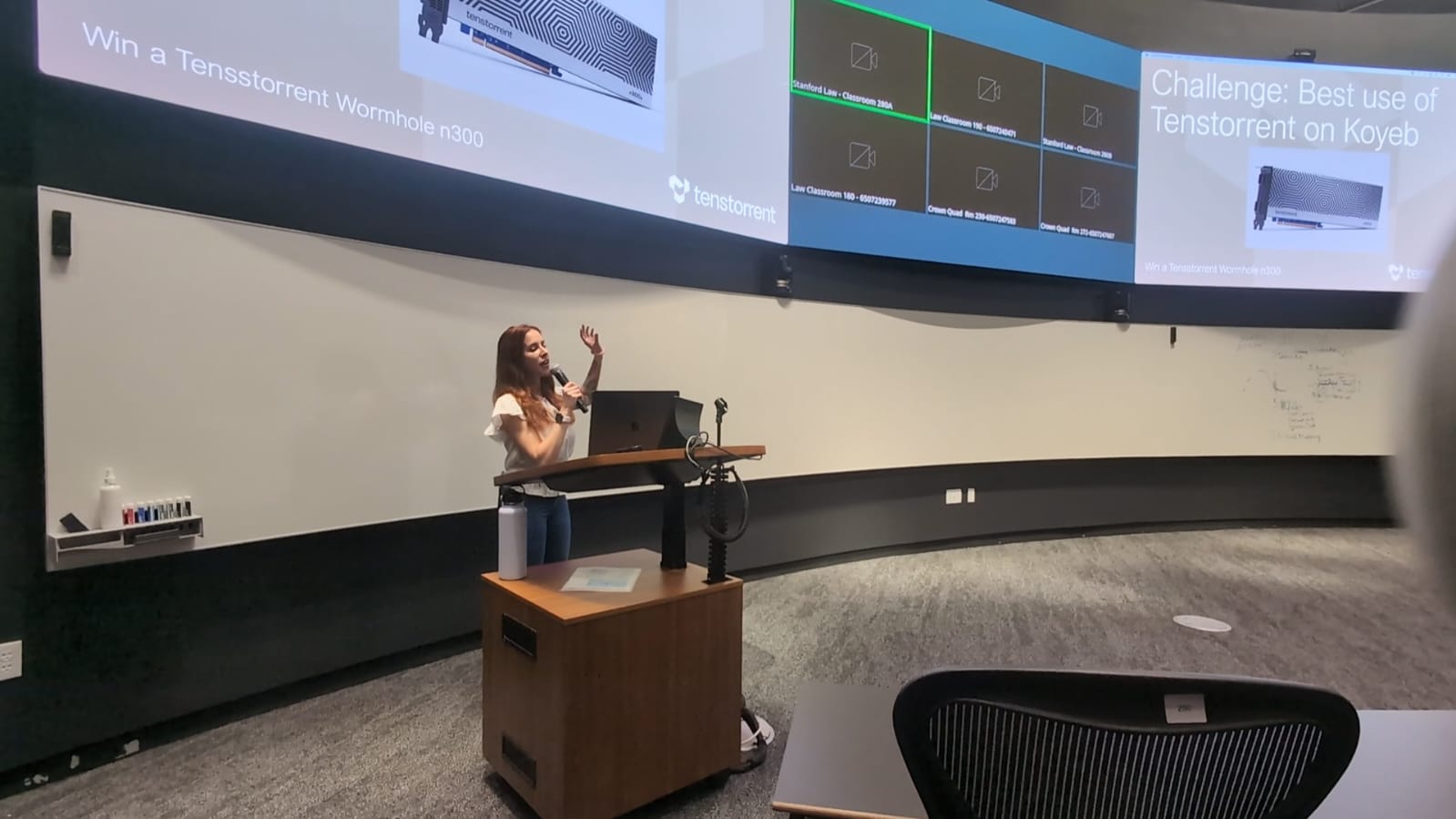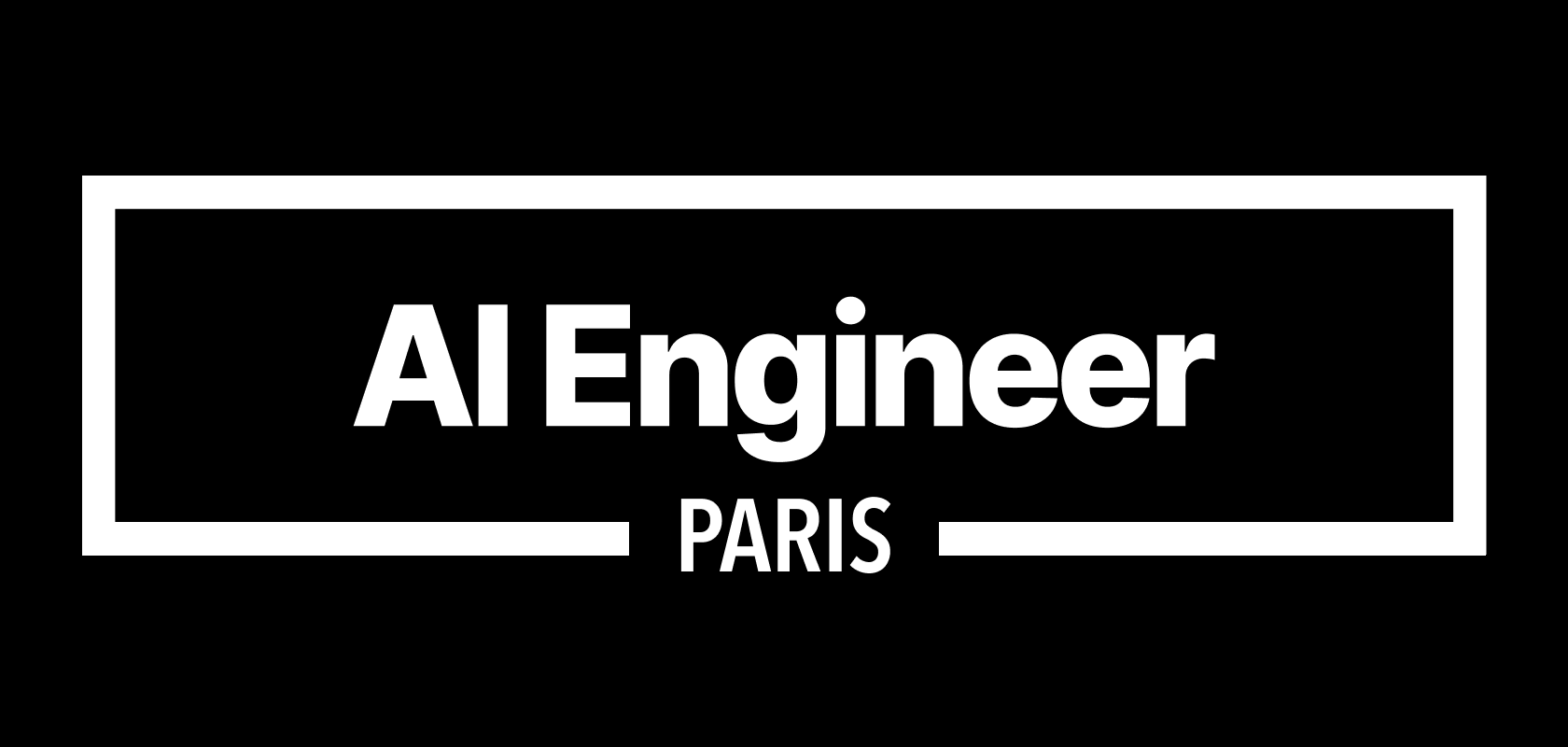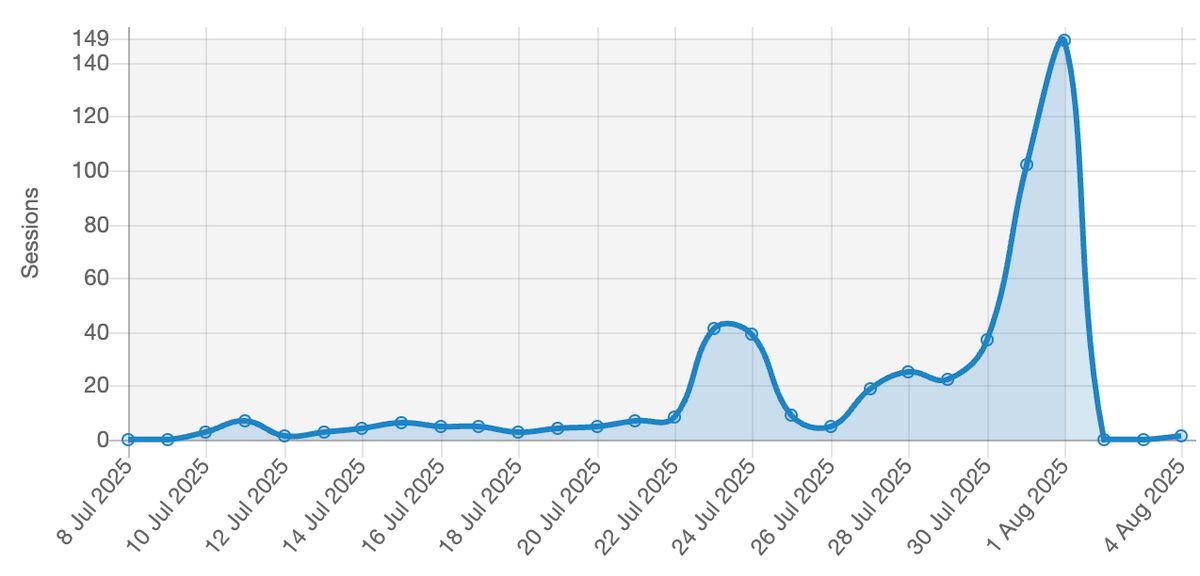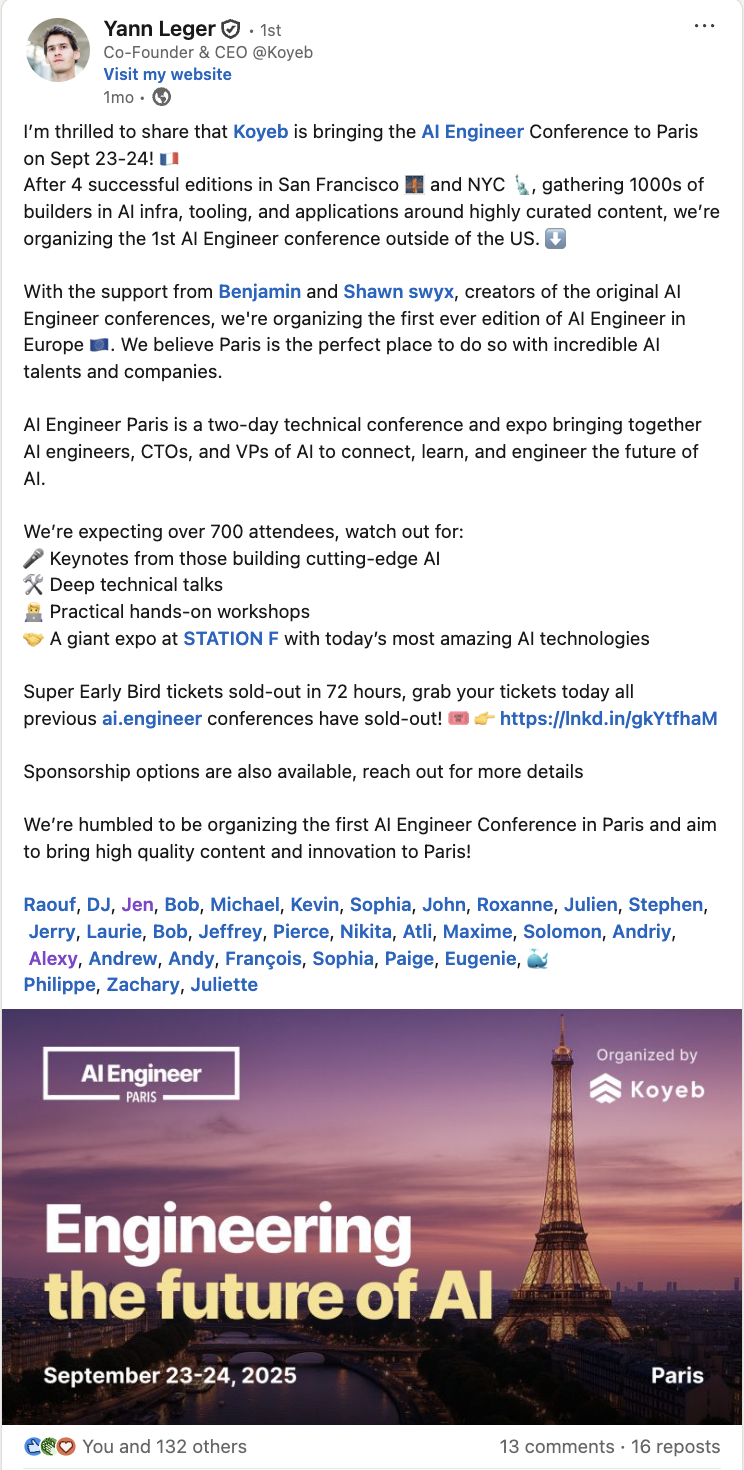AI Engineer Paris: How We Evaluated Over 500 Talk Submissions to Build the Best Lineup
During my career, I've submitted plenty of talks with mixed results in acceptance rates. When I got back a rejection, I always wanted feedback, but inevitably the organizers would tell me they couldn't provide anything specific, if they replied at all. CFP evaluations felt like a black box.

I recently joined Koyeb as the founding Developer Relations Engineer just in time to help organize AI Engineer Paris. AI Engineer hosts the highest-signal technical AI conferences, attracting AI engineers, ML practitioners, and technical leads. I attended the AI Engineer World's Fair in San Francisco earlier this year, and I was blown away by the scale and depth of the event! There was so much to see that I felt like I only scratched the surface. It's an honor to help organize the Paris event given the strong reputation of the AI Engineer conferences.

The CFP for AI Engineer Paris closed just a couple of days after I started my new position, so I figured I'd dive in and help choose the best talks for the event. With a staggering 509 talks submitted by 396 speakers, choosing the best options in a timely manner was a unique challenge. Even if we spent just 2 minutes evaluating each speaker, that would add to a total of over 13 hours of evaluation. This work came on top of my regular DevRel Engineer tasks—building demos, writing tutorials, updating documentation, etc.

The selection process involved a big spreadsheet, several columns of labels, and a lot of timekeeping. In the end, the process from start to finish took several full days of work, but I learned a lot along the way about being a speaker and an evaluator. In this post, I'd like to highlight some of my takeaways about submitting and evaluating sessions in hopes that I can help fellow speakers and event coordinators alike. I'd also love to hear your own thoughts and takeaways from your conference experiences, so reach out to me on LinkedIn to share!
- Your company matters
- Your role matters
- Be active on social media
- Include an example of you speaking
- Proofread your submission
- Don't advertise (or disguise it better)
Your company matters
In our tracker, I graded companies on a scale from 1 to 5 based on their name recognition in the AI space. This might be difficult to accept, but at large-scale conferences, the company you work for plays a role in whether your talk will be considered. When attendees and sponsors are considering being a part of an event, they naturally look at the logos attached to the speakers. Therefore, when choosing speakers, we also had to look at those logos. This doesn't mean you have to work at an enterprise company though; plenty of startups are well-known in the AI space.
When your company is unknown, you will have better luck at smaller local events with fewer submissions. Use these events to network and build your reputation as a great speaker. Your company can also organize meetups with partners and collaborators. Speaking at and hosting smaller events helps you build a network of people who have heard of you and your company. It's not a quick-fix to get you considered in the next CFP, but it is the path to get there.
Alternatively, plenty of events offer sponsorship packages that include speaking slots. Not every conference offers this (AI Engineer Paris doesn't, for example), and it's an expensive route. However, it can be a fast-track to building name recognition for your company for future CFPs.
Your role matters
This one is even more controversial in my opinion, but maybe it's just because people in my very role are more likely to be overlooked at certain conferences. Just like you and I evaluate a conference based on companies represented, we also evaluate based on roles. Personally, I'm more interested in hearing from people in a technical role as they're more likely to get into the weeds on a topic, but this event wanted to attract the most senior roles at companies--executives, founders, and so on. The roles that are favored depend on the goals and audience of the event. A conference highlighting technical deep dives will be looking for engineers who have a deep understanding of the technology. A conference focusing on real-world technical usage might choose solutions architects or customer solutions engineers. A conference about broader industry trends will be looking for industry leaders.
There isn't much you can change about your job title, but you can focus on applying to conferences whose goals align well with your role. Sometimes you can slightly modify your title to make it more enticing, but this can also backfire. Choosing a title like "AI Agent Wizard" will come off as unprofessional, for example, but if your role is considered senior or staff based on your ladder, then I recommend including that in your title.
Be active on social media
As part of the selection process, I quickly glanced at any social media profiles people submitted. If they had over one thousand followers on the given platform, I took note of it in our tracking document. Maybe they were no longer active on that platform. Maybe they didn't get a lot of interactions on their posts. Maybe the content of their posts didn't align to the messaging we wanted for the conference. For a smaller event, there would be time to consider these details, but with so many speakers, I only had time to glance and make note of the follower count.
I'll confess right now that I don't enjoy posting on social media. It takes a long time to craft a decent message, and I refuse to use an LLM to write my posts. I think LinkedIn and Twitter have plenty of AI slop without me contributing to it. On top of the time it takes to write posts, I often feel like I don't have anything meaningful to say or that nobody wants to hear it. Maybe you don't interact with social media and you find it a waste of time. Whatever the reason, I'm going to try to convince you that you need to post and you need to respond to people. You don't have to be on every platform, but you do need to be active on at least one platform.

Include an example of you speaking
Have you ever showed up for a talk that sounded super interesting only to end up disappointed? The content is only as strong as the storyteller.
This was a big lesson for us that we will change for future events: you must submit a video of you speaking to a live audience. Unless someone on the AI Engineer Paris planning team knew the speaker personally and could vouch for their speaking ability, a video was the only way of knowing if they were up for the task. Public speaking is a skill that takes time to craft, so if you've taken the time to learn that craft, you need to show people. This part of the submission is so important that I want to highlight specific suggestions for your video:
A low-quality recording is better than none
Not every event is recorded, but there are definitely opportunities for you to set up a tripod with your phone or even ask a friend to hold it and record. Personally, I don't care much if it's a low-quality video as long as I can hear you clearly and follow along.
Match the style of talk to the CFP
Pre-recorded tutorials and group panels don't give much context on how you will speak in a 20-minute live talk. Following a teleprompter without a live audience is a different skill than live speaking, and panels don't reflect the planning or speaking required for a tech talk. A tech talk at a local meetup of 20 people filmed on a shaky camera tells me much more about your speaking abilities.
Link to the most impactful part of the video
With 2 minutes of evaluation per person, I had 30-60 seconds to review their speaking ability. When you are linking to a YouTube video, scroll to the part of the video you want the evaluator to see, and use that in your link. Most videos started with 10-30 seconds of exposition, including introductions by an emcee and the usual "how was lunch?" chat. Time spent scrolling to find actual content is time taken away from discovering what an amazing speaker you are. Skip the intro and link to the good stuff!
Match your language to the event
AI Engineer Paris is presenting in English, so I needed to be able to evaluate the English-speaking capabilities of speakers. A handful of submissions shared videos in other languages. Since the event is taking place in Paris, I understand why people might submit talks in French, but the audience includes people who don't speak French. You should assume the evaluator speaks the language at which talks will be delivered. It goes back to time; turning on auto-translate takes valuable seconds, and it doesn't help me know if you can speak fluently in English anyway.
Send the right link
Check your links to make sure they go to the right place. A few entries linked to the beginning of a multi-hour livestream, so I was unable to evaluate their speaking. A couple even linked to a different speaker entirely. I'm not exactly sure how that happened, but I'm guessing that there was a playlist from an event and they selected the wrong talk.
Probably skip the portfolio
The theme here is time, so as you can imagine, I didn't have time to go through any portfolios. I think portfolios are incredibly useful for a variety of reasons: they create a place to track your progress and successes, they help new connections learn about you, they could be evaluated at smaller events with fewer submissions, and of course they're great for job hunting. But again, with a minute or less to look, I clicked the first link in any portfolio that was submitted. Sometimes that link wasn't a talk, so I simply had to move onto the next submission.
It's possible that a portfolio could provide a tie-breaker when picking between two submissions, but that didn't come up here. I think it's also possible that other evaluators wouldn't go through the effort to click within your portfolio, so if the submission specifically asks for a video, I suggest including that directly instead of a portfolio.
You must show your speaking ability
Up until this point in the post, I still haven't mentioned anything about what to include in your actual talk proposal. I didn't say anything about creating a compelling title, what voice and tense to use in your description, how long the proposal should be, etc. This was one of the most surprising things for me as I started to evaluate submissions: the proposal itself ranked so much lower in importance than other factors. I didn't even look at talk submissions until after I had narrowed down the pool based on company and speaker. If you spent a long time crafting the perfect submission, this probably sounds unfair. But I don't know the vast majority of the 396 prospective speakers personally, so I really couldn't evaluate anyone's ability to deliver content without an example of their prior speaking, even if the talk itself might sound super interesting.
To drive the point into the ground: please include a video of you speaking in your submissions!
Proofread your submission
I make a lot of typos. As I'm writing this, I can be sure that I've already made several. Sometimes my mind moves faster than my fingers can move across the keyboard, and I end up with a jumbled mess. That's why I have at least one person review my writing. Whether or not you struggle with typos, spelling, and grammar, you should also have someone check your work before you submit it. Your lack of mistakes won't make your talk stand out, but any mistakes will certainly make it stand out in a negative way.
Don't advertise (or disguise it better)
For the majority of speakers, our company helps cover the expenses related to speaking engagements, so there is naturally an expectation that we will be talking about our company's product. That being said, nobody wants to feel like they're in a sales meeting when they're at a tech talk; we attend tech talks to learn something useful beyond product advertising. When reading talk titles and descriptions, we looked for interesting problems to solve, trending frameworks and solutions, and unique perspectives. We looked to avoid talks that sounded like "How to use [our product] to do [x]." Your company will inevitably come up within your talk, but try to avoid making it the primary focus. You need to sneak in the product endorsement like a parent sneaks vegetables into a picky toddler's dinner.
Great candidates don't always get chosen
For every event, there are more speaker submissions than there are speaking slots. At the end of the day, even if you're a great candidate who checks all of the boxes, your talk won't always get chosen. Sometimes there is a theme to the event that your talk doesn't perfectly fit. Sometimes there is a similar talk that gets accepted instead. Sometimes it's just the luck of the draw. Try not to get discouraged! Keep attending events, practice speaking, keep applying, and your submissions will eventually get accepted.
Thank you
I want to close by extending a big thank-you to everyone who took the time to submit their talks. I found myself saying "I would love to see this" so many times that we could fill several conferences, and I mean that sincerely. I hope that this information adds a bit of clarity for folks who weren't accepted, and I hope you'll continue to submit your proposals for future AI Engineer events. I look forward to seeing everyone in Paris!
Join us at AI Engineer Paris 👈 Conference tickets are already over 60% sold, so get yours soon!